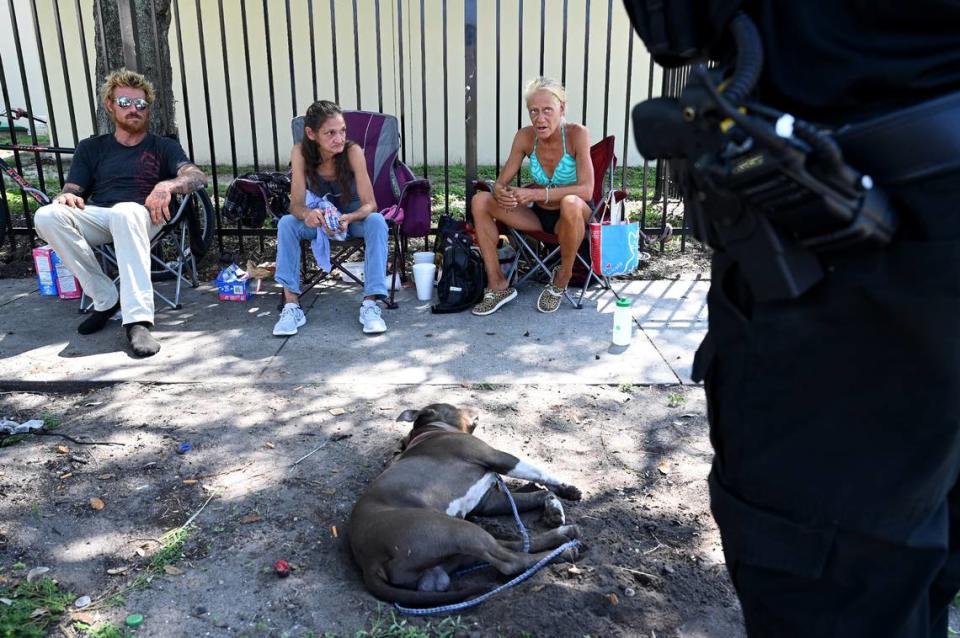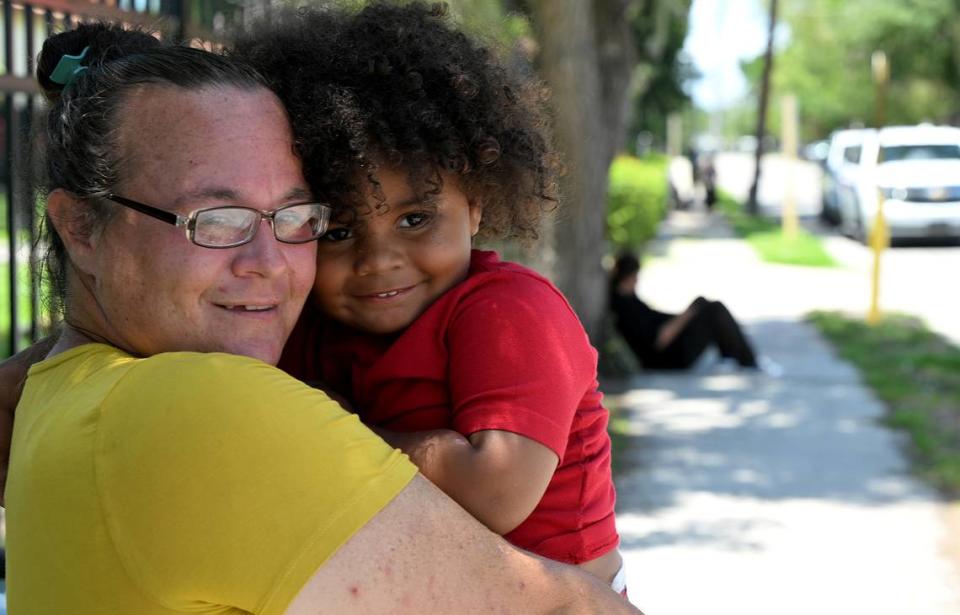Affordable housing in Manatee is ‘major barrier’ to reducing homelessness, report says
Heather Moore struggled in the summer heat to lift 2-and-a-half-year-old Noah from his stroller outside Bradenton’s Salvation Army for a diaper change.
Moore, 39, her son and her partner are some of the estimated 567 homeless people living in Manatee County.
The 2023 Point in Time report from the Suncoast Partnership to End Homelessness collected data from a single night to take a snapshot of the number of local residents without housing.
For a few weeks, Moore, Noah, and her partner lived on the sidewalk behind “the Sally” after losing their home in a nearby mobile home park. Moore said they had housing from Hope Family Services for a brief time, and stayed a few nights at the Salvation Army until their time limit was up.
Her partner tries to get work as a day laborer, but that is not a steady paycheck, she said.
“Sometimes he gets to work and sometimes he doesn’t. There are so many people that go, they literally run out of jobs to send people to. That’s how we pay for diapers right now, that’s how we sometimes stay in a hotel when my mom doesn’t have the money to pay for it,“ said Moore.
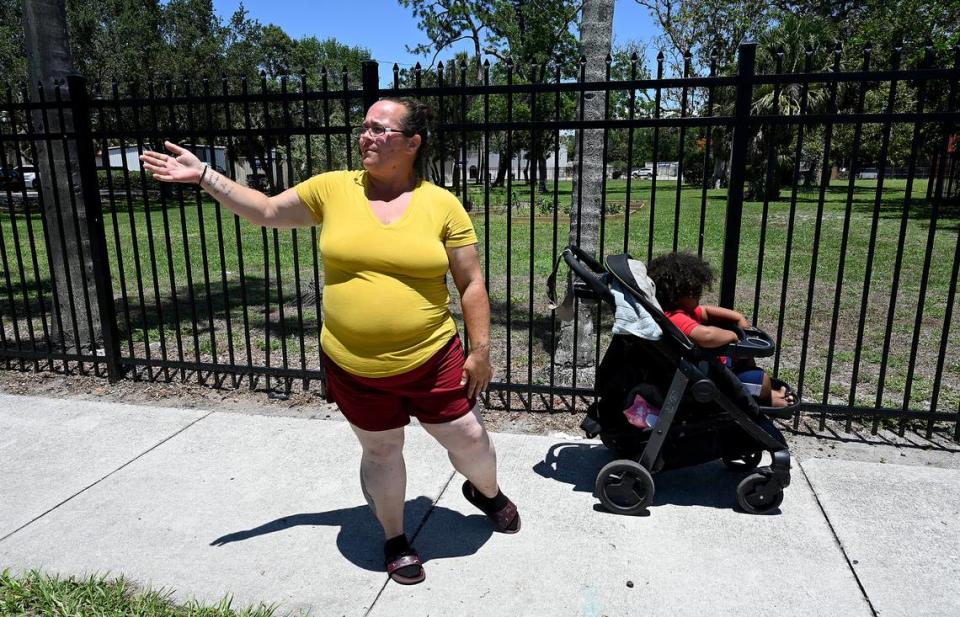
“I never thought I’d be like this, I don’t think anybody does. I was really, really, really scared,” she said. “I didn’t want my kid to ever have to go through this. I just started boo-hoo crying, like, oh my God, my son is going to be sleeping on a (expletive) road, how did I get to this point?” said Moore.
‘We’re all humans, right?’
There are services available for people like Moore and her family in Manatee County, and Bradenton Police Department’s Jordan Poulos has made it his mission to let them know what’s available.
“We’re here for the homeless population. We’re all humans, right?” said Poulos, a member of the department’s community-oriented policing group, which focuses on community outreach, crime prevention and working with the homeless.
“There’s nothing illegal about being homeless,” said Poulos, and for homeless children, “CPS is not going to get involved as long as the child is being taken care of.”
The small unit of officers is assigned to work with Bradenton’s Community Redevelopment Agency to connect people and businesses with services and grant opportunities.
A social worker and case manager from Manatee County’s Community Paramedic EMS Division rides along with Poulos a couple of times a month.
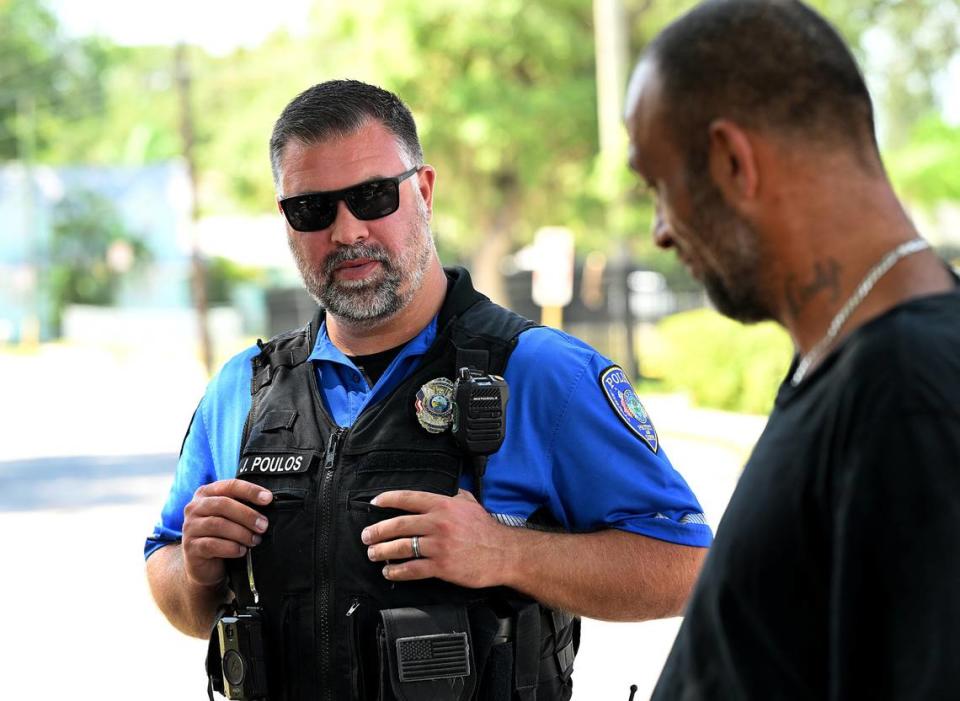
“What can we do for you? We are here to get you the services you need,” said Poulos.
Resources available, but housing limited
Turning Points and the Salvation Army are popular locations for homeless services in the area.
Meals, showers, laundry services and public assistance are available at Turning Points. The Salvation Army, mainly known for providing emergency shelter, offers social services and help for people facing crisis situations.
While options are available to serve the short-term needs of the homeless, the biggest limiting factor to a lasting solution is the lack of affordable housing.
“We have a lot of good services to assist them, however with the lack of shelters, housing and waiting lists, a lot of them are out in the streets and in the elements,” said Poulos.
“People are experiencing homelessness because there is insufficient affordable housing in Manatee County. We do not have enough emergency or short-term housing and zero permanent supportive housing units,“ said Kathleen Cramer, executive director of Turning Points.
Experts say permanent supportive housing is a proven solution to homelessness for the most vulnerable people. It pairs housing with intensive case management and supportive services, said Cramer.
Affordable housing is a ‘major barrier’
The Manatee County Homeless Task Force reports that 93% of service providers cite the availability of affordable housing as “a major barrier to client success” in a 2022 survey.
A deficit of roughly 20,000 affordable housing units was reported by the task force, making an end to long-term homelessness “nearly impossible.”
The group’s most recent quarterly report identifies three main gaps in services:
Permanent, supportive housing that combines affordable housing with supportive services like the proposed Tunnels to Towers project for homeless veterans.
Affordable housing — In 2023, almost three-quarters of people making roughly $20,000 a year were spending more than half of their income on housing.
Mental health and addiction services
The Suncoast Partnership to End Homelessness (SPEH) recommends partnering with nonprofits to offer therapeutic and addiction services inside emergency and transitional shelters to battle months-long waits for mental health appointments.
“I self-medicated for years, I spiraled into depression,” said Moore, who said trauma and sexual abuse as a teen were some of the challenges she faced in her young life.
In an interview with the Herald, Moore described her previous drug addiction and said she has become a patient at a local methadone clinic to stay sober.
Mental health problems affect an estimated 187 Manatee County’s homeless residents and roughly 87 are struggling with drug addiction, according to SPEH.
Manatee County recently created the position of Opioid Policy Coordinator, one of the first in Florida, and hired Brian Garner. He will help oversee the distribution of over $38 million that the county is slated to receive over the next 18 years from opioid litigation settlement funds.
Garner said he would like to see more options for homeless residents with substance abuse disorders to receive treatment and support.
Diversion programs, naloxone distribution and increased funding for inpatient and outpatient providers will be some recommendations Garner will propose to the Manatee County Commission to help anyone fighting to overcome substance abuse, not just the homeless.
The state has not provided much guidance as to how or when the funds will be disbursed, and any proposed programs will be implemented “at the direction of our Board of County Commissioners,” said Garner.
Garner will present his recommendations to county commissioners at an upcoming public workshop meeting.
“I’m all prepared if it happens tomorrow or in three months,” he said.
Manatee seeks homelessness solutions
Another roadblock for people searching for housing is the availability of transitional housing while on a waiting list for permanent housing or job-seeking.
Moore and her family are now living out of a car while they wait for housing.
In the meantime, city and county officials are working on new incentives that make it easier for developers to provide affordable housing, such as smaller unit sizes, lower parking requirements and grants to support construction.
Commissioners have also directed staff to move forward on the renovation of a former Manatee County Sheriff’s Office facility at 407 57th Ave. E., Bradenton, to convert into a full-service family shelter to be used as transitional housing, according to the task force report.
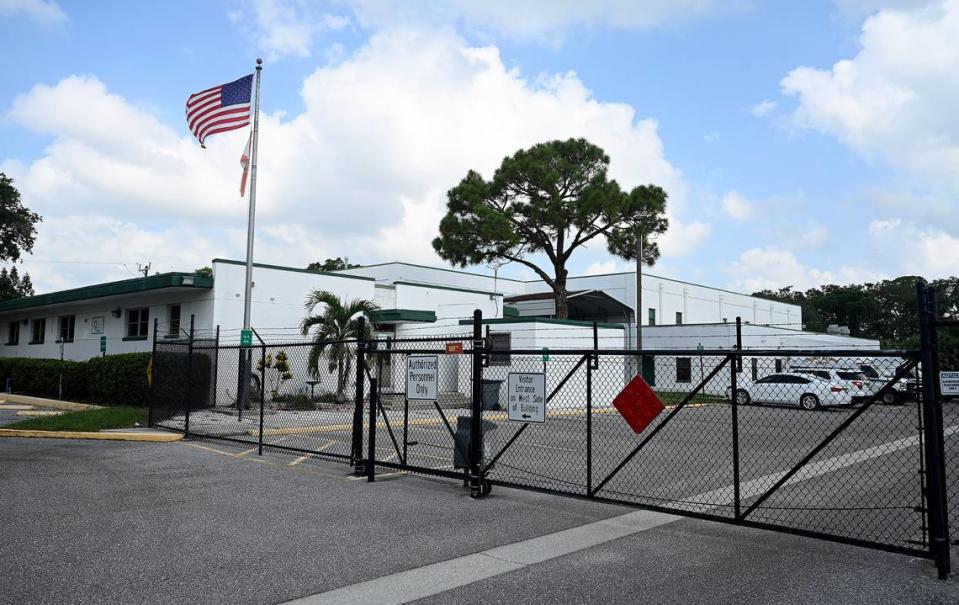
“Literal homelessness” is described by the Florida Housing Coalition (FHC) as those “living in a place not meant for human habitation (including outdoors or in their car), emergency shelters, transitional housing and motels paid for by a government or charitable organization.”
The latest report from the Florida Housing Coalition shows a 2.8% uptick in the number of people experiencing homelessness across the state.
Manatee County’s Homeless Task Force will continue to meet once a month to work on “actionable and effective strategies” identified by the 50-page Roadmap to End Homelessness report from the Florida Housing Coalition requested by and presented to commissioners during a public meeting in March.
The county will work with the FHC and the task force until the end of the year.
“The task force is a critical next step. We must be working in concert on focused efforts to bring real change for the community. With the Florida Housing Coalition Roadmap as the guide, the task force has a coordinated way forward,” said Cramer.
Recently, Poulos’ face showed a look of happy wonder after a conversation with a homeless man who struggles with addiction.
“I’ve known Michael for a long time, and that’s the first time he ever said he’d be interested in getting help.”
As Poulos walked back to his truck, he wore a small smile.
“This work is a challenge, but the moments when you see a change, that’s so rewarding.”

